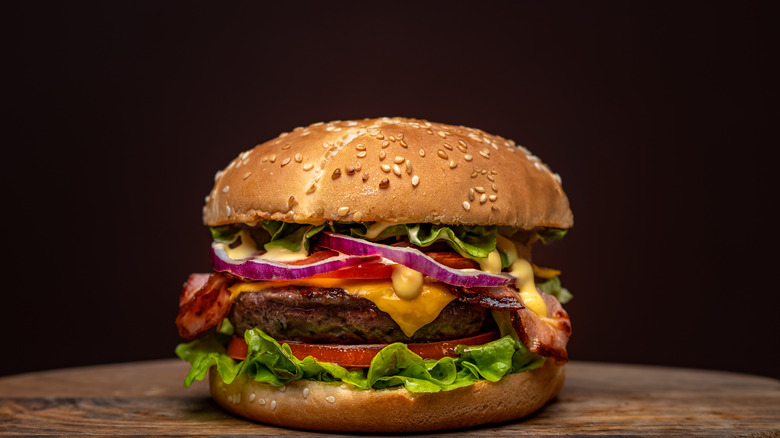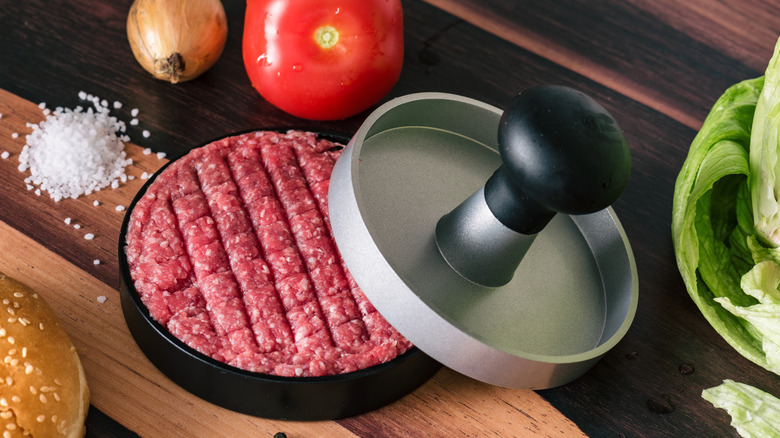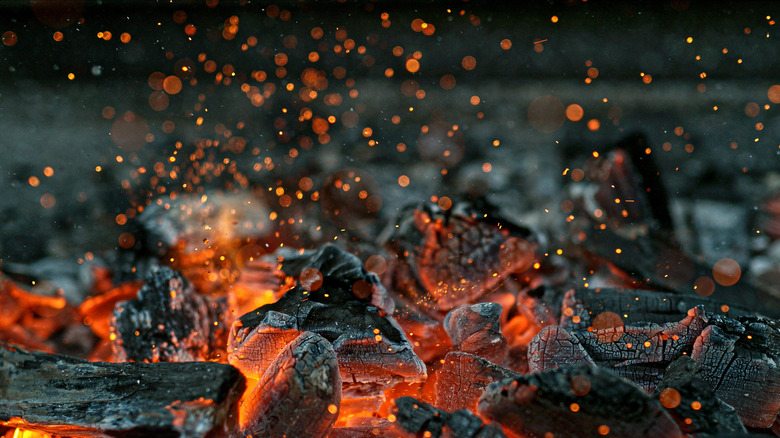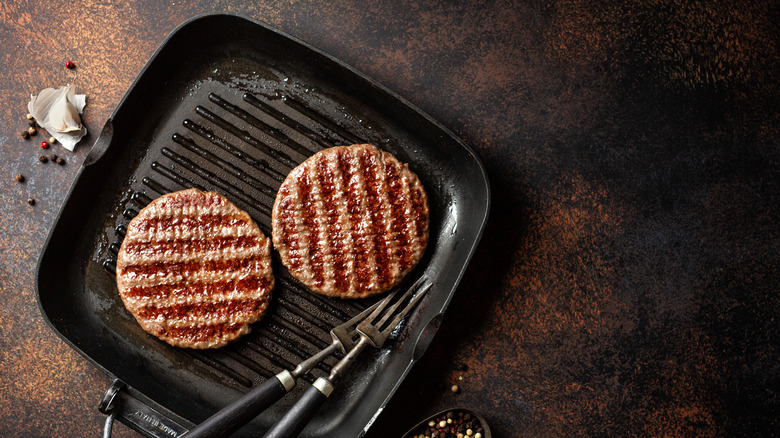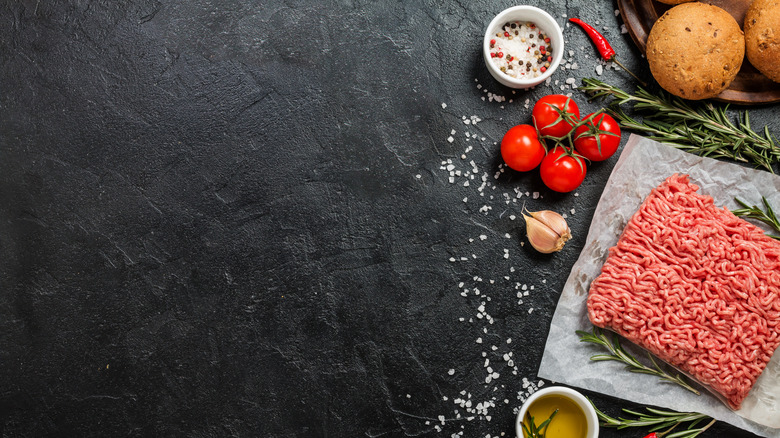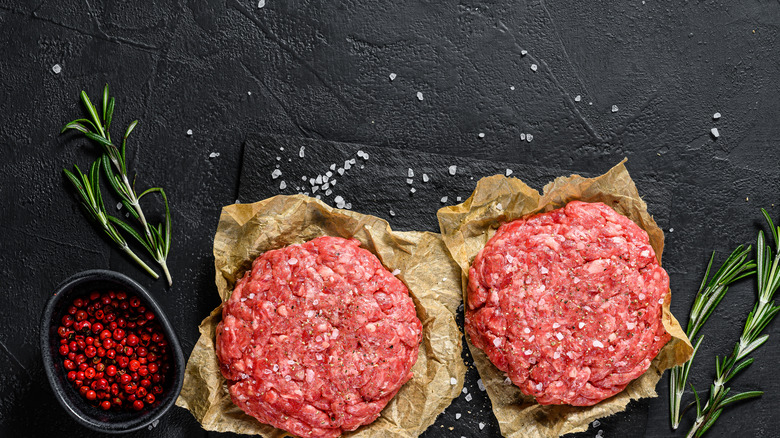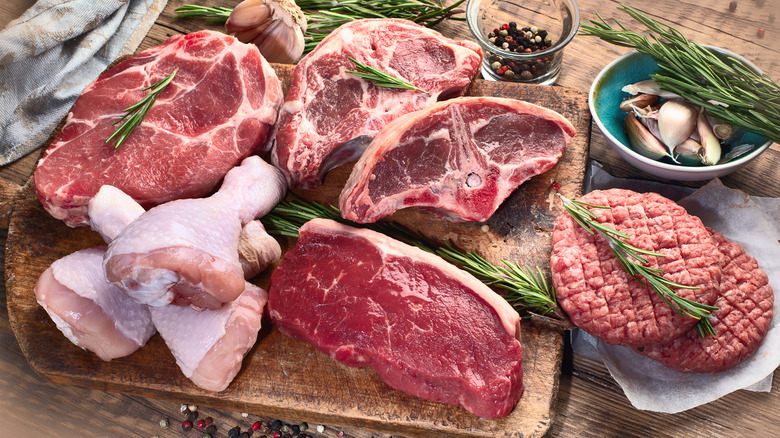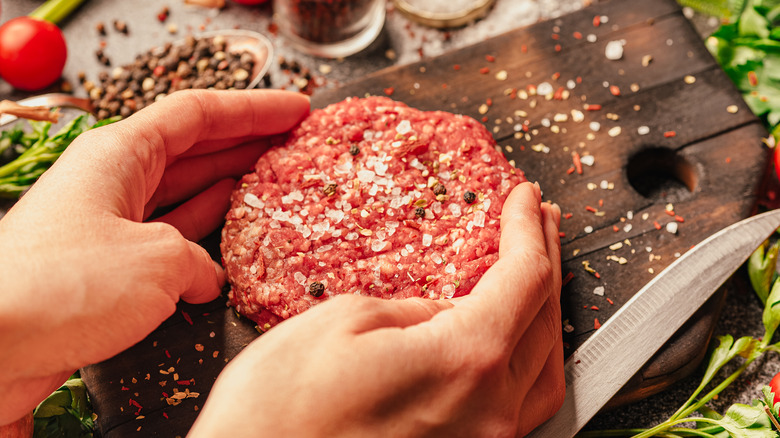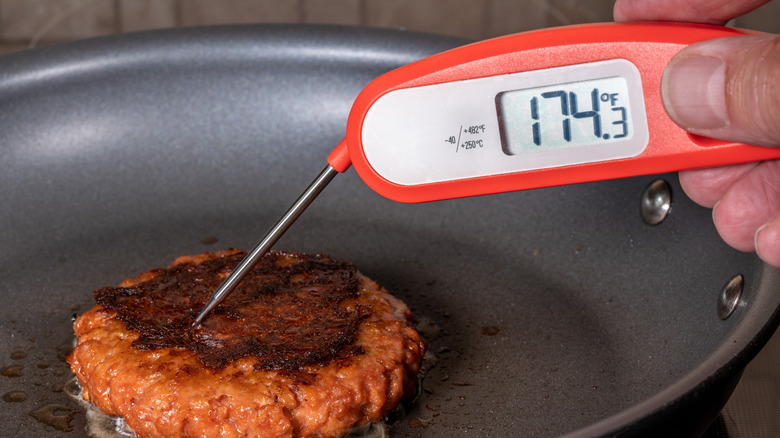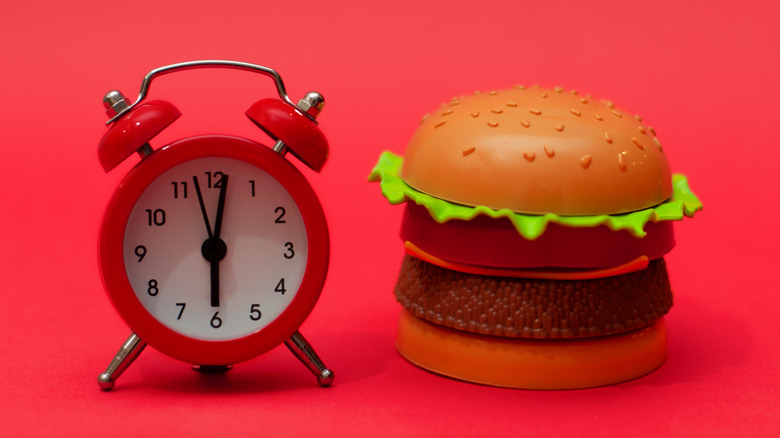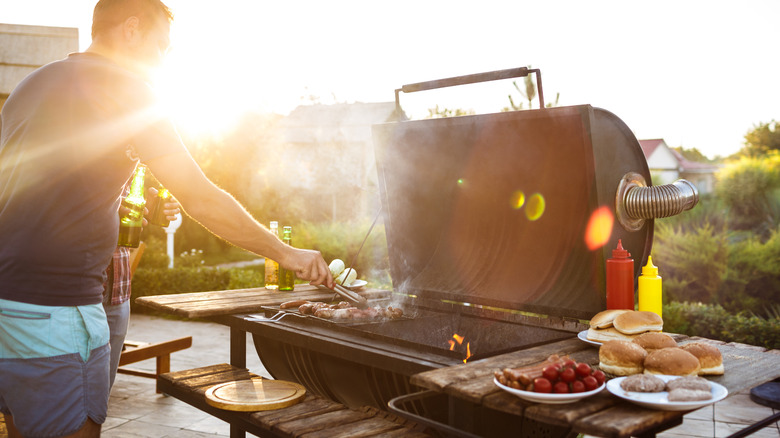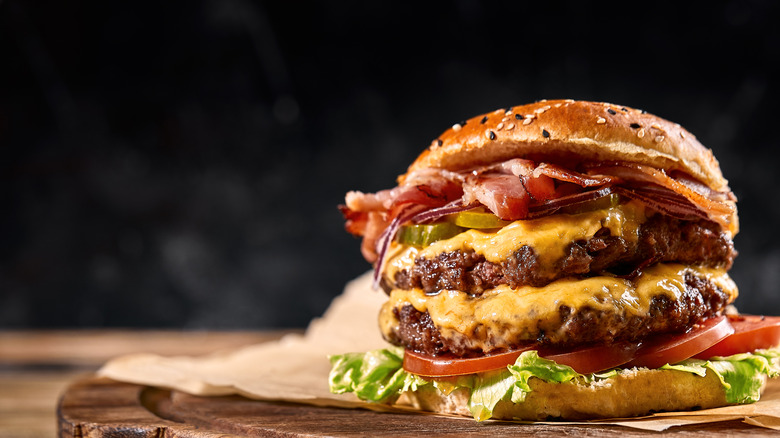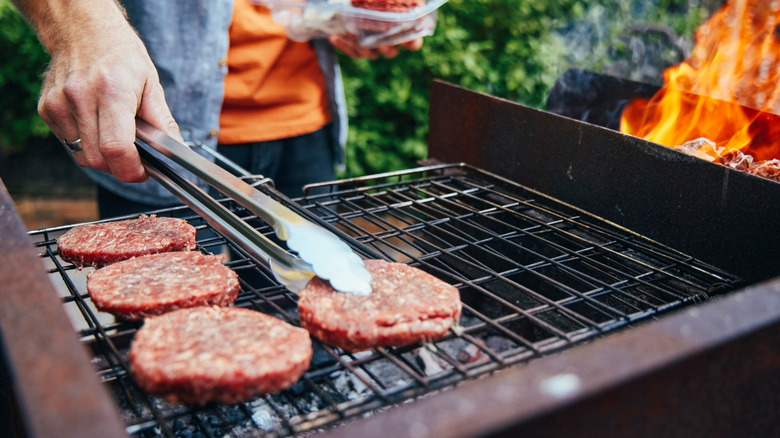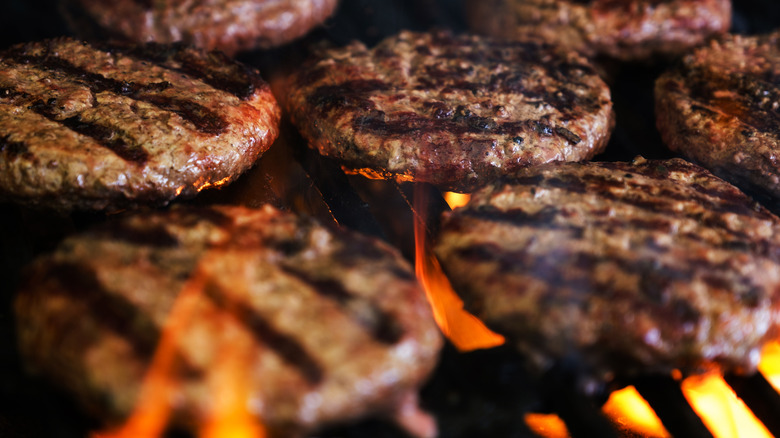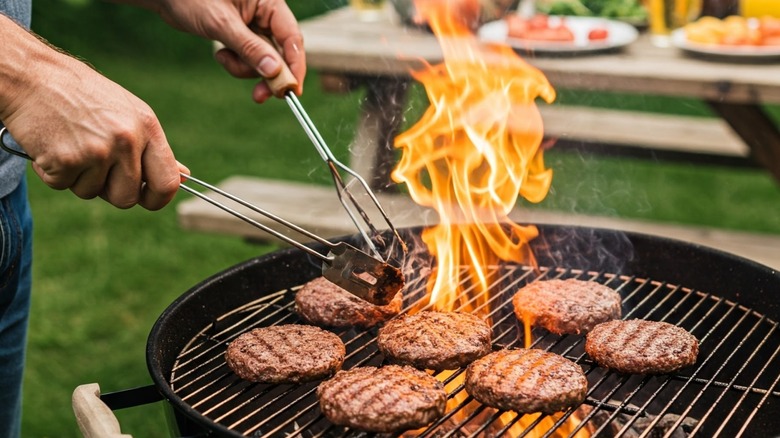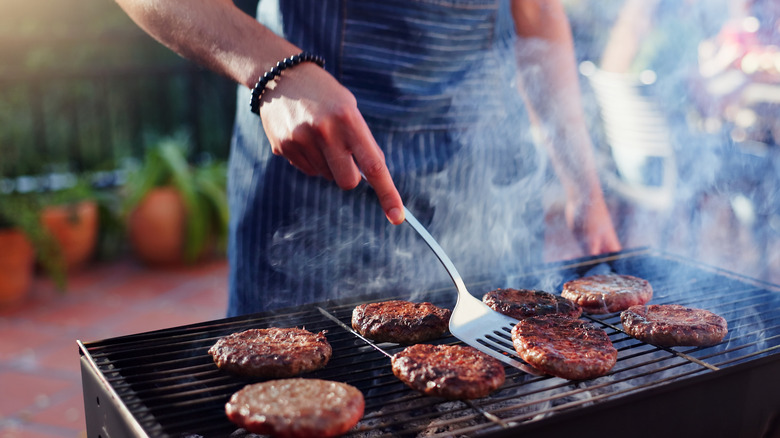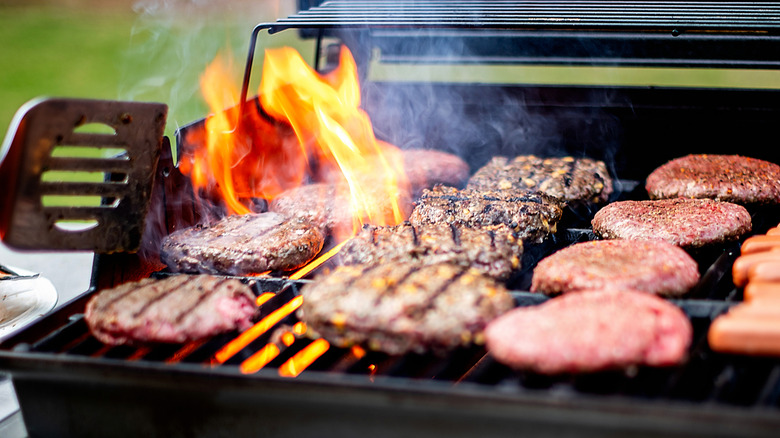Mistakes Everyone Makes When Grilling Burgers
There's maybe no more quintessential summer dish than burgers, especially hot off a sizzling grill.
But no matter how you like your burger — be it well done, medium, or rare — or if you like it pretty basic or stacking with cheese and other toppings, you're going to want to make sure that burger is really good. And that starts from the minute you buy the meat and continues when you prep it and then how you season it. And then, there's what happens when it's on the grill.
Burgers may look casual and uncomplicated, but the truth is there's a lot of steps along the way that can impact how a finished burger ends up tasting — and once you learn to avoid those potential grilling mistakes, you'll be really happy with the resulting burger. So, whether covered with cheese, bacon, avocado, or some wild combo of onions and peppers, that burger will be hot and sizzling, and exactly how you like it. Now, let's learn more about what those burger grilling mistakes are.
Pressing down on the burger might be trendy, but it could lead to grilling mistakes
Smashed burgers have been all the rage lately, and many people now think the best way to make a burger is to press down on it, in order to make it cook fast and get a deeper sear. That's not the best course of action though. Pushing down on burgers, steak, chicken, or any other meat actually has some drawbacks and downright risky possibilities, such as causing grill flare-ups, and it could even potentially lead to a rather tasteless piece of meat.
"When pressed down, the natural juices that the meat should be cooking in are actually being pushed out of the cut of meat," ButcherBox Head Chef Yankel Polak told Mashed.
Polak maintains if you press on your burger, you will undoubtedly end up with a dried out, overdone piece of meat, and that's something no one wants for dinner, no matter how they like their burger.
Using a grill that's not hot enough for burgers can create some messy mistakes
There's nothing like the sound of sizzle when a burger goes onto a superhot grill. But it's about more than just looks and sound — a hotter grill also leads to a better burger.
For a great grilling experience, you'll want to light the grill correctly and give that grill adequate time to heat up. "A properly heated grill should be at about 500 degrees Fahrenheit," ButcherBox Head Chef Yankel Polak told Mashed.
A good rule of thumb is that you shouldn't be able to hold your hand a few inches above the grill for more than a few seconds. "When using charcoals, the grill is hot enough when the charcoals are all gray," said Polak.
Cooking on a grill that hasn't reached a good temperature can cause great damage, especially if you're using ground beef burger patties. "Things like homemade burger patties can end up sticking to an under-heated grill and create quite a mess when you try to unstick them," said Polak. "The Millard reaction, a process of browning meat that creates that all important crust, only happens at very high temperatures."
Basically, unless your grill is hot enough, your beef patties won't sear — they'll just stick to your grill instead. This is probably one of the easier burger grilling mistakes to fix, so turn the heat up and wait just a little bit longer before grilling your next burger.
Moving burgers around when grilling is another common mistake
Stop messing with the burgers when they are on the grill, or you're not going to like how the finished product looks or tastes in the end. Just place the burger on the grill and don't touch it, experts advise.
"Let it cook for about 3-5 minutes (depending on size and level of doneness) then flip only once to finish cooking, never pressing down on the burger," Laura Pauli, a Chef and Sommelier at Cucina Testa Rossa in San Francisco, told Mashed.
Your burger will come out much juicier this way, and this also goes for any other meat, including steak, pork chop or chicken. "The natural tendency is to check it, check it again, rotate it, check it again. Stop, step away from the grill, set down your tongs, grab a beer, let it cook, then flip it to finish," said Pauli. Just lay back a bit, and you'll be the hero of the barbecue!
Over-seasoning burger meat before grilling is a not-so-tasty mistake
It makes sense that seasoning a burger would be good, to add to flavor – but you don't want to go too far too much in advance.
"Growing up my parents would do the most with the ground meat the day before," New York-based Hormel consultant, Chef Vanessa Cantave, told Mashed.
Holding back on the seasoning is a way to get your burgers to taste like a grilled meatloaf patty. "Over the years I've learned that buying high quality meat and keeping the seasoning pretty basic creates a way better burger," said Cantave. "You get a great meaty flavor with a good char on the outside and juicy on the inside."
This doesn't mean you can get crazy with the cheese or sauces and favorite toppings, but just keep the burger seasoning simple: Cantave recommends kosher salt, freshly ground pepper, garlic and onion powder.
Buying lean burger meat for grilling is a mistake if you want flavor
There's a lot of reason to try to stay healthy and eat lean, but while trying to buy a leaner, lower fat burger, you might also be sacrificing flavor. It's all about balance, and a great grilled burger is not the time to worry about your calorie intake.
"Go for ground chuck, rib or porterhouse where the fat is so wonderfully marbled throughout the meat. 80/20 chuck is my go-to. Nobody regrets a great juicy burger, ever!" Hormel Contributor and New York-based caterer Chef Vanessa Cantave told Mashed.
With that being said, there are definitely healthier burger options out there, including turkey burgers or even veggie burgers. But if you're going to go for a beef burger, go for a real burger — or be prepared for it to just not taste the same. Perhaps instead of going too lean with the burger, consider adding a side of veggies to the meal for balance. Then you don't have to sacrifice flavor!
How you can prevent the mistake of too much shrinkage when grilling burgers
Everyone has seen a burger that is big when raw and looks like it's half the size when cooked. There's a reason for this.
"You have to remember that with all that fat melting your burger is going to lose about 30% of its volume," Hormel contributor and New York-based caterer Chef Vanessa Cantave told Mashed.
The amount of burger shrinkage depends on several factors, but those factors can include fat content, amount of moisture, and the temperature at which the meat is cooked, according to Five Star Home Foods. Try to keep this in mind when shaping your patty.
"I also like to shape my patties a bit wide and flat so the end result is one that fits perfectly in the bun, rather than the dreaded hockey puck," said Cantave. This will also help to manage your expectations for the size burger you will be serving if everyone is looking pretty hungry!
Here's a mistake you could be making when shaping your burgers for the grill
Try to remember that you're making burgers, not meatloaf or meatballs. A great burger is going to taste the same from the first bite to the last bite, and that means that you need to keep the fat evenly distributed within the patty (via Eat This, Not That!). If you're standing there constantly mixing and working that ground meat, you will melt and mash a lot of the fat, and there goes that even distribution. The result could be a pretty dry, drab, tasteless burger – and that's just a sad waste of chewing!
Uniform even burgers also cook more evenly, according to Eat This, Not That!, which is an important way to make sure you don't end up with a burger that's thick in some areas, thin in others, and too rare in spots but too well done in other spots – also leading to a rather disappointing tasting experience overall.
Starting with cold burger patties when grilling is faster, but it's not smarter
People often take the burger straight from fridge to grill, but that's not the best way to go when making burgers as burgers that are straight from the fridge and cold will not perform best on the grill. "It will make beef seize up, because of the sudden temperature change from cold to hot," Food Network Star finalist and recipe developer for Chop Happy, Jason Goldstein, told Mashed.
Cooking straight from the fridge to the grill also produces uneven cooking: This could mean a burger that is charred outside and raw inside. "It's best to let burgers come to room temperature before cooking, about one hour on the counter," said Goldstein.
One of the first things to do is to give raw burgers or steak some time between taking it out of the refrigerator and throwing it on the cooking surface. "This allows for most chefs a more evenly-cooked product," ButcherBox Head Chef Yankel Polak told Mashed.
Not giving your burgers time is another rookie grilling mistake
You don't want to overcook those burgers and turn them into hockey pucks, but you also don't want a bloody mess if someone was hoping for a medium well burger. It's important to use the proper cooking time, but it's also good to find out what that proper cooking time is.
Grilling burgers should be considered to be much like grilling a ribeye steak. None of this smash burger stuff for the grill just to get the sear as quick as possible — it's about putting in the time and patience. "Flipping often and allowing to rest for 10 minutes on the cooler side of the grill is the only way to go," James Zamory from Carnal in Bellingham, Washington, told Mashed.
People assume burgers are normally hot and fast, but the properly grilled burger should take about 30 minutes from start to finish, said Zamory. So, save the smashed patties for the flat top grill or cast iron.
Not letting your grilled burgers rest is a mistake that only takes a little more patience to fix
Another common mistake people make with burgers is taking the burger directly from the grill onto the bun. We get it, you're hungry and it looks delicious, but that burger is not yet ready to be enjoyed!
"As with any grilled meat, the burger needs to rest before serving—we've just fundamentally changed the composition of the burger from its raw state to its cooked state, and so it needs time to relax and let the juices settle back in," Chef Brandon Collins, a sommelier at Maille, told Mashed.
When you go directly from grill to bun and eat right away, you're allowing those juices to escape before they've redistributed throughout the meat. "The first bite may be nice and juicy, however, all of that juice will end up on your plate or running down your arm by the last bite," said Collins.
So, let that burger rest. The taste will be well worth those extra few minutes of waiting.
Going a bit too far with grilled burger toppings is another (understandable) mistake
A recent YouGov survey found that 74% of burger lovers top their burgers with cheese, and other toppings were also in the mix, ranging from pickles and lettuce to ketchup, tomatoes, onions, and mustard. Burgers are fun to build and everyone has a personal mix of their favorite blend of toppings and fixings — but you don't want to go so far with toppings that you can't taste the burger!
"Try to limit your cheeseburger to two toppings and a sauce," Mike Puma, founder of Gotham Burger Social Club, told TODAY. You want to have a burger that is pretty, of course, but it's not like it'll even be easy to eat if you can't bite into it!
So, aim for a burger that will fit in your mouth and one that doesn't have so many toppings that all the extra flavors become overwhelming and you forget there's a burger inside there, too!
Cooking veggie and meat patties on the same grill can cause issues for plant-based eaters
Vegetarians and vegans know all too well the challenges that come with grill work. Having a tasty selection of non-meat burgers at the ready may provide equal opportunity enjoyment, but the fun comes to a screeching, charbroiled halt when the plant-based patties share the same space on the grill as the meat patties. Not only does it cross-contaminate animal fat with animal-free patties, but because these two types of burgers have distinct compositions, they require slightly different considerations when it comes to heat and timing on the grill. Plopping them down side-by-side is a sure-fire way to ruin the good times.
To avoid this flavor of barbe-confusion, designate a separate section for plant-based items away from meat to keep things clean and tidy. This may require a pre-cleaning to get the gunk from the last cookout off the grate, so give yourself a little time ahead of the shindig to get your grill in shape. Your herbivores will thank you for your thoughtfulness.
Not brushing your burgers lightly with oil to prevent sticking and add flavor is an avoidable faux pas
Thinking there's enough fat in the meat to do the job could leave you in a world of hurt when it's time to serve your burgers. When the composition is 90% lean and the meat meets the heat, the dryness of the patty can create a scorched, puck-like burger that sits on the platter until the party's over. The healthful aspect of eating burgers this lean is a noble and necessary pursuit, but your grill isn't so forgiving with the lack of fat in the material it's working with.
Control the fat content and the odds for successful grilling by brushing a bit of oil on the top and bottom of your lean patties to prevent a sizzling heartache. Using olive oil will let you incorporate a light, nutty layer of flavor that complements the meat, while creating a sheath between the meat and the hot metal without drying things out too much. If you notice a bit of drying mid-cook, you can brush on a little oil to keep things loose and easy. But be cautious: Oil hitting fire can be a real barbecue buzzkill, so go light and make sure it only touches the top of the patty, and be gentle with your flipping to prevent flare-ups.
Forgetting to customize cooking time and temperature based on different burger meats can cause trouble
Each burger type has its specific requirements, which means placing burgers in separate zones on the grill and tracking their timing and doneness individually. Lean beef burgers will cook differently than chicken or turkey burgers, and veggie or alternate meat patties have their own personalities when it comes to applying the right level and duration of heat. Omitting this important aspect of the art of the grill can result in some burgers being done to perfection and others being destined for the dustbin.
For your surest path to patty success, designate zones for each type of burger based on composition and ingredient type. With a gas grill, you should have a few burners that allow a variety of temperatures you can visually separate based on the grates and the dials on the control panel. Create high-, medium-, and low-heat zones that let you score big points with eaters for patties that are properly done, and you'll be on your way to earning your grill master badge. Don't forget to use the warming rack if you have one; this lets you keep your finished patties warm without overcooking, until you can get them to the table.
Not keeping an eye on your burgers while they cook is a big error
Some people close the lid and hang with guests while the heat builds, thinking they'll come back to perfectly-cooked burgers. Not likely. Your luck may hold and all your pretty patties could turn out exactly as intended, but more often than not, you'll see smoke rising before you realize you've forgotten something crucial to your burger-busting backyard cookout: the burgers themselves. Now instead of juicy, succulent burgers, everyone will be eating bun sandwiches filled with iceberg, tomatoes, and disappointment. And all you had to do was keep your peepers on the patties while they cooked. Nice going, ace.
If you're the designated burger cooker, prepare to be on patrol from start to finish to ensure a proper and appetizing finish on every last patty on the fire. Don't press the flipper on the meat, don't flip too often, and don't forget to move them from higher to lower heat as they finish up, so you can control the interiors and exteriors simultaneously. Setting a kitchen timer or a countdown on your phone or watch can help you track individual burger types as the cook, lest your attention be drawn away temporarily and you lose focus — as long as you get it back quickly, you'll be a smashing patty success.
Treating fresh and frozen patties with the same grilling principles could end up ruining your cookout
Obviously, fresh and frozen patties are entirely different, but it's easy to think tossing everything on the grill at the same time under the same heat will get it all to the finish line simultaneously. Even if the timer dings for both patty types at the same time, you'll end up with different levels of doneness, some of which may render your burgers inedible. The fact that frozen patties start out sturdier than fresh is a keen visual clue to the specific needs of the two different formats, but it can also instill a sense of false confidence regarding the time and heat required to arrive at your desired dining destination.
For best results, consult the frozen patty package to determine how long and how hot to cook them; chicken, turkey, beef, and bison patties could have slightly different specs that should all be regarded individually to accomplish the task deliciously. Similarly, frozen plant-based and alternative-meat patties play by their own rules, so adhere to the instructions if you're not familiar with their game. And if your patties are freshly formed and made by hand, keep an extra-close watch as you apply heat to make sure you don't give the goods too much fire at first. A meat thermometer is also a wise idea to serve up a safe burger when you're dealing with a variety of touchy patty types.
